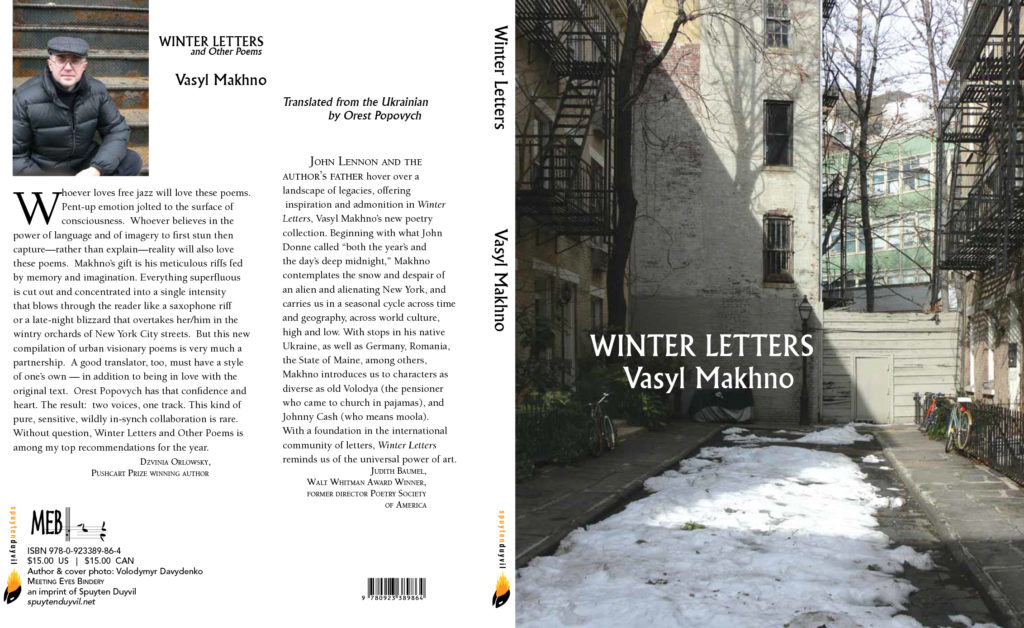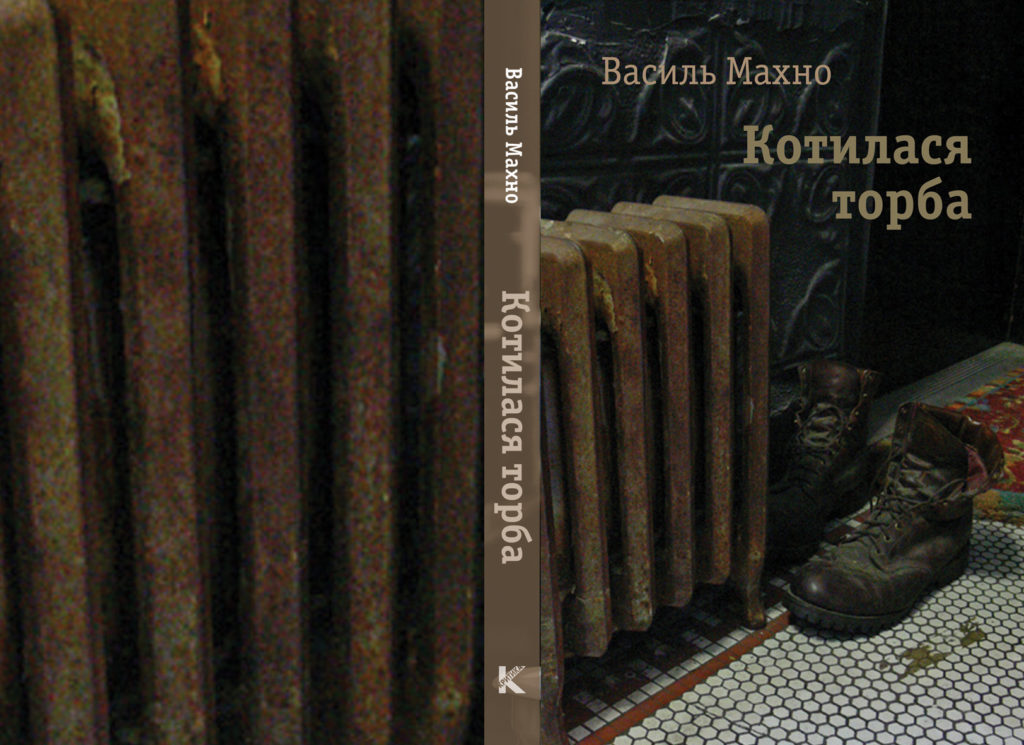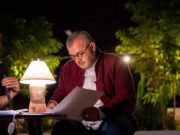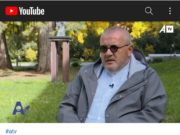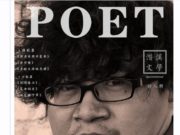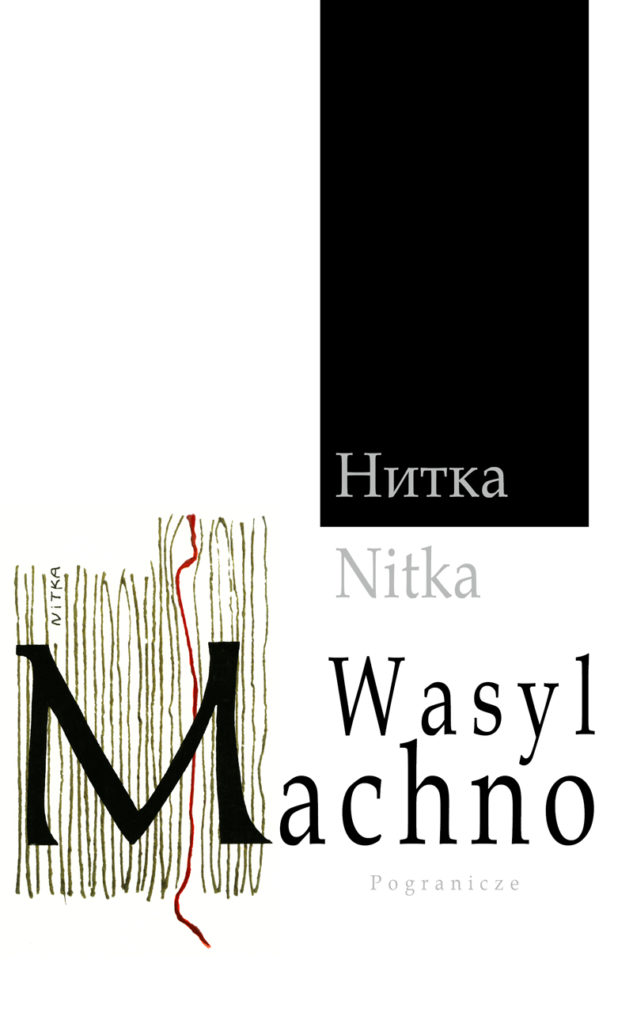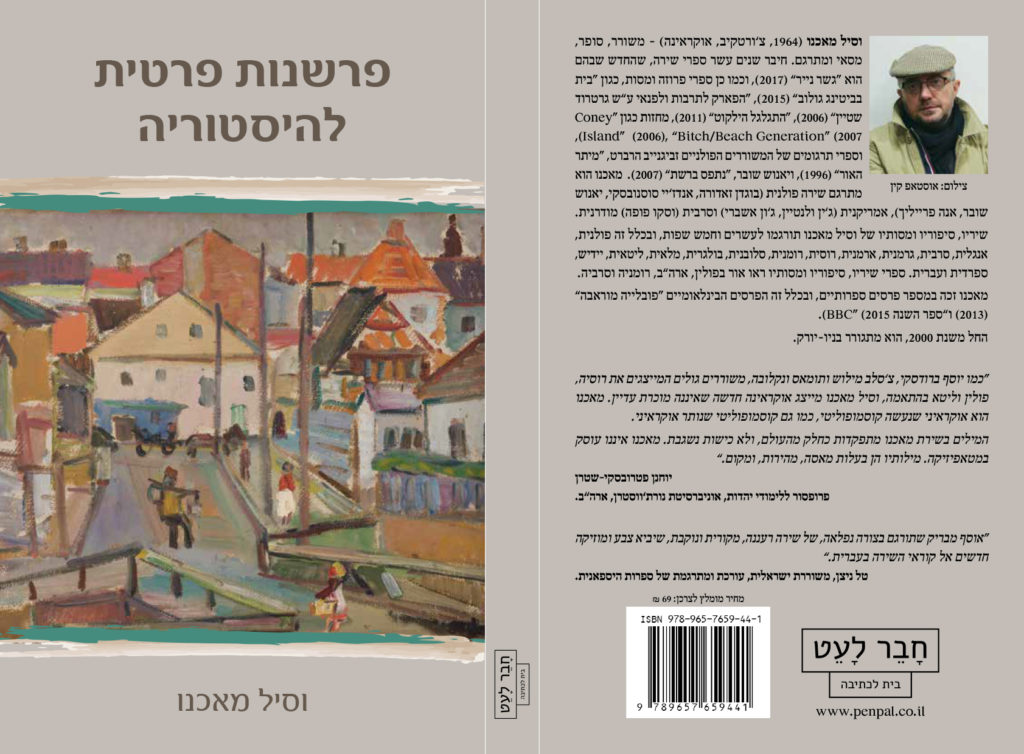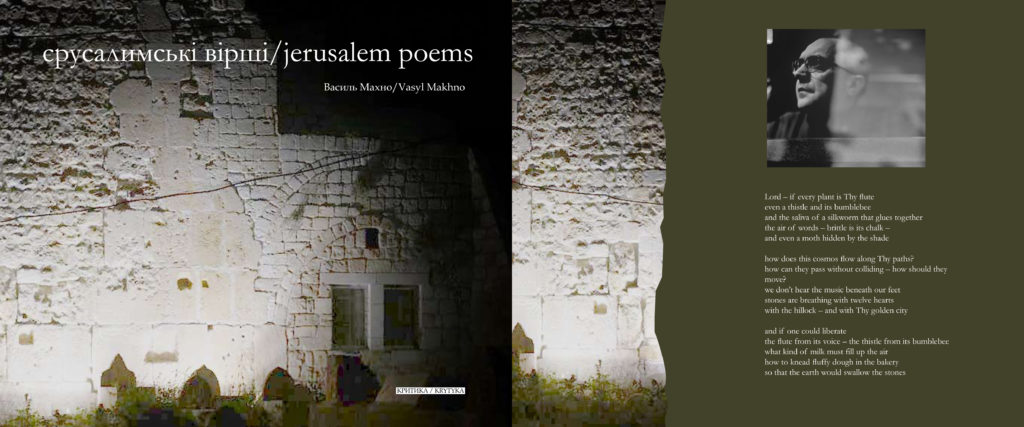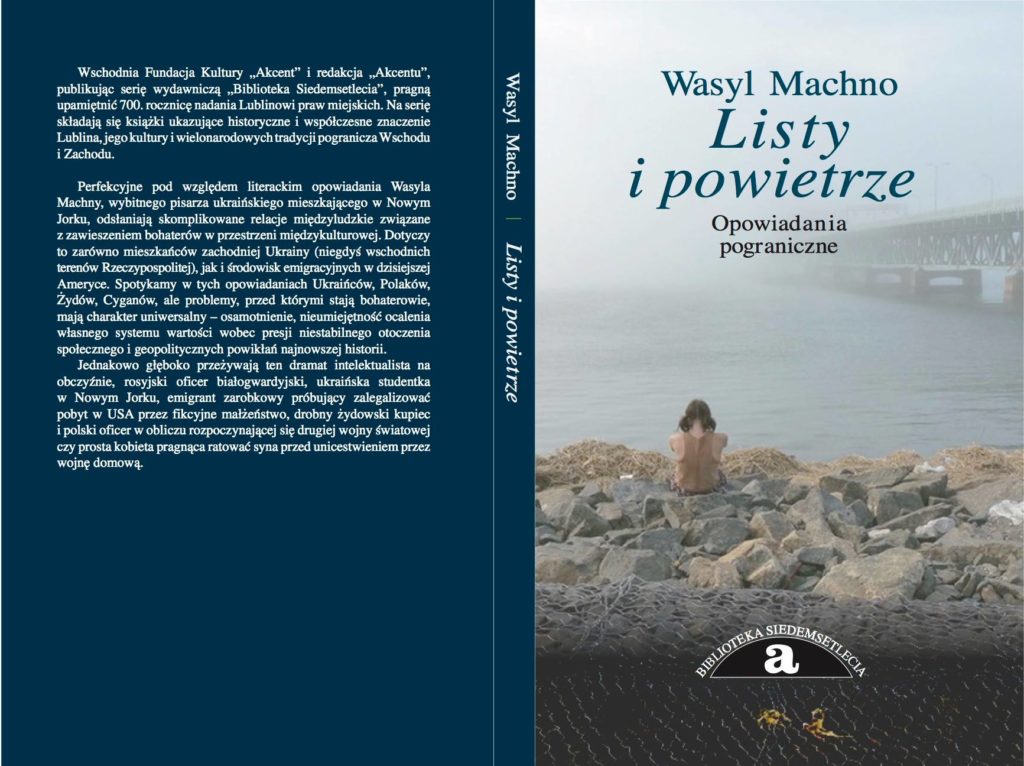Vasyl Makhno is a poet, prose writer, essayist, and translator, he was born in 1964 in Chortkiv, Ukraine. He is the author of twelve collections of poetry: Skhyma (1993), Caesar’s Solitude (1994), The Book of Hills and Hours (1996), The Flipper of the Fish (2002), 38 Poems about New York and Some Other Things (2004), Cornelia Street Café: New and Selected Poems (2007), Winter Letters (2011), I Want to be Jazz and Rock’n’Roll (2013), Bike (2015) Jerusalem Poems (2016) and most recently Paper Bridge (2017). He has also published book of short stories House in Bating Hollow (2015) and two books of essays The Gertrude Stein Memorial Cultural and Recreation Park (2006) and Horn of Plenty (2011), and two plays Coney Island (2006) and Bitch/Beach Generation (2007). He has also translated Zbigniew Herbert’s and Janusz Szuber’s poetry from Polish into Ukrainian, and edited an anthology of young Ukrainian poets from the 1990’s. His writing widely translated in many languages. Collections of poetry, prose and essays books appeared in Poland, Serbia, Israel, Romania, and USA. He participated in international poetry festivals in Serbia, Poland, Germany, India, Colombia, Nicaragua, Macedonia, Romania, Slovenia, and the United States. He is the 2013 recipient of Serbia’s Povele Morave Prize in Poetry and BBC Book of the Year Award 2015. Makhno currently lives in New York City.
Василь Махно/Vasyl Makhno
Translated from Ukrainian by Orest Popovych
Сигіт Мармароський
У Сиґіті Мармароському пахли червиві яблука
і циганки чіплялися за рукави щоби поворожити
казали що знають про тебе усе
від них несло цуйкою пережованою зранку цибулею
і українськими цигарками
які вони проносять через прикордонний міст кілька
разів на день
Ранішні тумани закутували місто аж під шию
вони сходили з гір – як місцеві селяни – до Сиґіту на ринок
і залишались на вулицях
і притулялись головами до будинків
наче бездомні пси
цього міста
Я стояв на перехресті вулиць
дорожній знак вказував напрям на Бая-Маре
десь поблизу відреставрована синагога
православна церква і ратуша та кілька перевернутих вітром
сірникових коробок будинків свідчили про занепад
усіх европ та імперій
і лише залізниця побудована за Австрії
принаймні кудись вела шарпаючи вагонами
наче неслухняну дитину за руку
і потяг
в’їзджаючи в гори навіки у них зникав
забравши звідси з собою євреїв
бо їм не можна було тут жити
це значить молитися у синагозі
доїти кіз та продавати червоний перець
їздити до Бая-Маре та Угорщини
і співати щосуботи своїх сумних пісень
тут взагалі не можна було жити
серед дерев’яних церков з кириличними написами
зі святою Варварою картинами Страшного суду
євангелістами що тримають напоготові вказівний палець
як ключ
а нічний сторож мабуть
замикаючи церкву на ніч і вхід на цвинтар
лаявся що ключі та замки поржавіли
А у Сиґиті Мармароському пахли також розчавлені сливи
з коричневими очима кісточок як у мертвої корови по яких лазили
мухи і мурахи
і було зрозуміло що нічний потяг прибуває до двірця
бо машиніст задовго до зупинки сигналив
цим горам яблукам сливам і змученим циганам
які пили вино у придорожній корчмі
і брудними руками патрали всмажених пстругів
і кричали до власника
щоби той приніс білого хліба ще
але швидко
бо їм потрібно було встигнути доїхати до прикордонного переходу
коли їхні жінки з контрабандними сигаретами
повертатимуться домів
Sighetu Marmatiei
In Sighetu Marmatiei the odor of wormy apples
and gypsy women grabbing at your sleeves to read your fortune
claiming to know all about you
they reeked of homemade brandy laced with the onions chewed in the morning
and Ukrainian cigarettes
they smuggle across the border bridge several
times a day
morning mists would envelop the town up to its neck
descending from the mountains – like the local villagers – to the market in Sighetu
and lingering on the streets
they snuggled up to the buildings with their heads
like the stray dogs
of this town
I stood at the street intersection
where the road sign pointed towards Baia-Mare
nearby a restored synagogue
an Orthodox church the city hall and a few matchbox houses
overturned by the wind attested to the downfall
of all the Europes and empires
and only the railroad built back in Austrian times
at least was heading somewhere tugging the cars
like a disobedient child by hand
and the train
entering the mountains would vanish in them forever
having taken away the Jews
for it was impossible for them to live here
meaning to pray in their synagogue
to milk their goats and sell red pepper
to travel to Baia-Mare and Hungary
and to sing their mournful songs each Sabbath
it was impossible to live here in general
among the wooden churches with Cyrillic inscriptions
with the pictures of St. Barbara and the Last Judgment
with the evangelists each holding at the ready his index finger
like a key
and the night watchman probably
while locking up the church and the cemetery gate for the night
would grumble that the keys and locks were rusty
And Sighetu Marmatiei also smelled of squashed plums
with their pits resembling the brown eyes of a dead cow
with flies and ants crawling all over them
and it was obvious that the night train was approaching the station
for long before the stop the engineer was signaling
to these mountains to apples to plums and to the tired gypsies
drinking wine at the roadside tavern
and gutting fried trout with their dirty hands
while shouting at the innkeeper
to serve more white bread
on the double
For they had to reach the border crossing by the time
their women were returning home
with
bootlegged cigarettes
La Chica*
Вона Алехандра – вона з Меделіна,
я знаю цей дощ їй замочить коліна.
Вона мотоцикл свій притягне з парківки
затиснена в джинси – обцаси/підківки
блищить медальйон електричного світла –
-два тижні вагітна –
Любов як ламбаду з Міґелем крутила
ця музика танцю жахка як кропива
притиснувшись тілом до тіла Міґеля
вона лиш шепнути йому не встигла
що манґо цвіте між ногами – й достигло
тепло у постелі
Тобі – Алехандро – усе це проститься
коли твій дружок на тобі проспиться
і Господа будеш за нього просити
щоб визріла в лоні сперма бандита
і що в цих bandidos з глухих закамарків?
-запитує Маркес –
вона віддавалась Міґелю – й при тому
пірнала за ним – він тримав непритомну
розсунувши ноги із солодом манґо
вони із ламбади заходили в танго
спідницею Діву Марію прикрила
-вставала й курила –
хтось гримав дощем – і сполохано кури
вотузились зранку – сніданок прокуриш
в будинку куди забрели віді вчора
тримали ще пса й – на обійсті корова –
і ноги зі срібла кінцівками ножиць
ніяк не вміщались
в Прокрустове ложе
Міґель пістолет прикладе наче палець
я думаю скаже ми вже накохались
і чорні banditos суміжні квартали
залишать з Міґелем – три ночі не спали
вони стерегли цю любов і ламбаду
Мігеля застрілять а їх пересадять
життя у bandidos завжди під прицілом
і снайпер Міґеля знайде і поцілить
це буде зима хоч в Колумбії літо
тримай – Алехандро – дарунок бандита
що сам проростає – тому що вже нудить –
і Бог не осудить
і Бог не осудить
*La Chica (есп. –дівчина)
La Chica*
She’s Alejandra – she’s from Medellin,
I know her knees will get soaked by this rain.
She’ll pull her motorbike from the parking space
– squeezed into tight jeans – her heels with metal taps
electric lights reflecting from her pendant –
– she’s two weeks pregnant –
Love like the lambada she spun with Miguel
the music of this dance stings like the nettle
pressing her body against Miguel’s
she had no time to whisper to him
that mango blooms between her legs – and that heat
had ripened in their bed
For all this – Alejandra – God will forgive you
when your partner will have finished on top of you
and you’ll pray to the Lord for him
for the bandit’s sperm to mature in your womb
– and what’s the attraction of those bandidos from obscure locales?
– asks Gabriel Garcia Marquez –
she would surrender herself to Miguel – and soon
would plunge toward him – he held her in a swoon
parting her legs with the sweetness of mango
from the lambada they’d switch to tango
the Virgin Mary with her skirt she’d cloak
– eventually she’d get up and smoke –
rain thundered through – and the startled chickens
bustled about in the morning – you’ll miss breakfast by smoking
in this house which we yesterday reached with some effort
they also kept a dog and – a cow in the barnyard
and our silvery legs like the extremities of scissors
no way could fit
in the bed of Prokrustes
Miguel will point a pistol like a finger
“I think” he’ll say “we’ve had enough love”
and the black bandidos will leave the surrounding vicinity
with Miguel – hadn’t slept for three nights
guarding his love and the lambada
Miguel will be shot and the others locked up
lives of bandidos are always in the cross-hairs
and a sniper will find Miguel and hit his target
this will be in winter though in Colombia it’s the summer
hold on – Alejandra – to the bandit’s gift
which keeps growing – that’s why you feel nauseous already –
and God will not condemn you
and God will not condemn you
*La Chica – Girl in Spanish
Jardin
чоловіки виходять у домотканних пончо
з костелу – обсадженим помаранчами – їм забезпечують почет
дощ і зелена гусінь – прикривши ходи червоточин –
прикривши вихід і вхід
залишаться тут до ранку – як стіни суцільні й бруківка
коні й корови на схилах – запаху довга шнурівка
котру здоганя в підворітні обчухраний пес-каліка
йому вслід свистять бухі
«Сhevy» старе з 70-тих – Пілар з молодим команданте
він носить військову сорочку – і профіль вигнанця Данте –
схоже вони прилишились щоб з нами трохи піддати
і скоротати ніч
злива котра прошуміла принісши каміння і морок
коханцю Пілар – під тридцять а їй вже давно за сорок
зимові дощі не вічні – а їй же признатись сором
– пошепки віч-на-віч –
рипне щоночі клямка – педаль «Шевролє» чи клапан –
хтось під вікном готельним в ніч свою прочалапав
а поруч спини тремтіння – і манґо задушливий запах
з цезарками і курми
тут ще зима – а потім виставлять дощ на Facebook’у
пишучи вірші щоранку можеш набити руку
можеш спіймати погляд який співрозмірний звуку
й зливам серед зими
й цим придорожнім шахтам – мокрим мішкам з вугіллям
селянам що сходять в неділю групами як на весілля
цим робітничим селищам – втомленим – що присіли –
в глиняний товщ
тому це містечко в горах сто років в дощах – й столітні
висовують морди назовні бездомні пси з підворітні
у дверях господар курить – а дві індіянки вагітні
минають його і дощ
постукують пальці дощами глиною й гострим камінням
похитується на швидкості водій і його кабіна
і поліцейський при мості – і міст – і стебло карабіна
і дерев’яний Христос
війна це лице Че Гевари що носить молодь Колумбії
це черепиця і глина – Casa культури – клуби і
вартовий поліцейський з очима консервної скумбрії
залитій в томатний морс
це кавування в опівніч на площі перед костелом
це дощ що тебе посріблить і нитку світла простелить
Пілар що пускає з димом свої таємниці під стелю
– срібні браслети змійок –
у цій випадковості місто – цей сад помаранчі – і “Chevy”
це відчуття що нині життя й наркота дешеві
і що прощання з марксизмом – це вірші прості й душевні
-подряпини що не змию –
це відчуття чужого що завтра залишить місто
що смикне разом зі світлом тільки разок намиста
візьме кілька вулиць з псами – і навиками садиста
притлумить цвіт помаранч
який забиває ніздрі – й вітанням в крамниці буенос
що схоже на глину й рослини – й повітря як послід зелене
і футболіст в телевізорі – блиснуть фінти й перстені –
в падінні втрачає м’яч
й останні у цьому сезоні дощі й футбольні матчі
збираються після служби при телевізорі мачо
викрикують сперечаються – суддя помилився й призначив
сумнівне пенальті
і кожен масивну руку із сіткою жил – на мачете
і в дощ цей зелений на полі суддю як теля замочити
і витерти лезо мачете в траву щоби зразу навчити
футбольних понятій
я місто це із футболом залишив – корови й собаки
залишаться з помаранчами, їх соком липким – їх смаком
дощем що залишиться з ними – що їм забиває баки
відносно ста літ
бо час що пливе по бруківці тримається й за одвірки
на площу виходить слово – вовіки віків й навіки –
перебігає вулицю сполоханий пес-каліка
цей біг потребує століть
бо що я тут зможу сказати: за ніч нас завалить водою
і спорожніє площа – що плентатиметься за тобою
й будинки зійдуться докупи і стануть одною стіною
може як вірш
і будуть стояти при тобі арепа іспанської мови
і будуть летіти на крилах сині молочні корови
ну а червоні пасуться – і роги їх як корони
тримають
підсвічники гір
Jardin*
men in home-woven
ponchos emerge
from the church – surrounded by orange trees – their retinue provided by
the rain and green caterpillars – covering the wormhole tracks –
covering the exit and entrance
they’ll remain here until morning – like the massive walls and cobblestones
like the horses and cows on the slopes – a long shoelace of smell
with which a scratchy crippled dog catches up in the foyer
drunks whistling at his heels
an old “Chevy” from the 70’s – Pilar with a young “comandante”
he wears an army shirt – and the profile of an exile from Dante –
it’s likely they stayed behind so as to tie one on with us
and shorten the night
the downpour blew over bringing rocks and darkness
Pilar’s lover – is almost thirty while she’s well over forty
the winter rains are not forever – but for her this is embarrassing to admit
-whispering face-to-face
squeaking every night is the doorknob – the pedal or valve of the “Chevrolet” –
under the hotel window someone walked barefoot in the mud
while close by a trembling back – and the suffocating scent of mangos
with guinea fowl and chickens
here it is still winter – but later they’ll post the rain on Facebook
writing poetry each morning you can gain experience
you can catch a glance equivalent to the sound
and the winter downpours
and to these roadside mine shafts – to the wet sacks of coal
to the villagers who descend on Sunday in groups like a wedding party
to these workers’ settlements – tired – squatting –
in the clayish slime
therefore this little mountain town has survived a hundred years in the rains – and the centennial
stray dogs poke their snouts out of the foyers
in the door the proprietor is smoking – while two Indian women pregnant
bypass him and the rain
fingers are drumming like the rains the clay and sharp stones
from the speed the driver and his cab are rocking
and the policeman at the bridge – the bridge – and the stalk of a rifle
and the wooden crucifix
war is the face of Che Guevara worn by the youth of Colombia
it is the tiles and clay – the Casa of culture – clubs and
the police guard with the eyes of a canned mackerel
covered in tomato juice
it’s drinking coffee at midnight in the church square
it’s the rain that casts a silvery glow on you and Pilar spreads a thread of light
letting loose her secrets with smoke up to the ceiling
– the silver bracelets of the snaking puffs –
in this instance the town – this orange orchard – and the “Chevy”
give the feeling that today life and dope are cheap
and that bidding farewell to Marxism – are verses simple and from the soul
– scratches that cannot be washed away –
this is the feeling of a stranger who will leave this town tomorrow
together with the daylight he will snatch only a string of corals
and capture a few of the streets with the dogs – and with the habit of a sadist
stifle the orange blossoms
which stuff the nostrils – and in a store with the greeting “buenos”
resembling clay and plants – and the air green like chaff
and a soccer player on television – flashing feints and rings –
falls down after losing the ball
and at the end of the season of rains and soccer matches
after work by the television gather the machos
shouting arguing – the referee made a mistake by awarding
a dubious penalty
and everyone places his massive sinewy hand on a machete
ready to slaughter the ref like a calf in this green rain on the field
and to wipe the blade of the machete on the grass so as to teach him right away
what’s what in soccer
I left this town with its soccer – the cows and dogs
will stay behind with the oranges, their juice – their gluey taste
the rain that will remain with them having baffled them
for one hundred years
for the time that flows on the cobblestones holds fast and beyond the doorposts
onto the square emerges the word – for ages and ages – and forever
the startled crippled dog crosses the street
this run requires centuries
for what more can I say: over night we’ll be inundated with water
and the square will empty – shadowing you
and the buildings will merge and become a single wall
perhaps like a poem
and beside you will stand the arepa** of the Spanish language
and the blue milch cows will fly on their wings
while the red cows are grazing – and their horns like crowns
are holding up the candelabra of the mountains
*Jardin is a town in Colombia
**Arepa are pancakes made of corn flour
Берлінська осінь
справді – історія міста майже до всього дотична:
до віршів в яких уже маса критична
дійшла до абсурду – біля кас залізничних
відсутність попиту й пасажирів
до заможного турка що роками берлінить
відстамбулив своє – тепер в першім коліні
смажить темні каштани і м’ясо на зміну
обтираючи руки від жиру
все подібно: таксисти у черзі дрімають
за будинком рекламу подерту знімають
асфальтують бруківку – авта гасають
і згасають вогні запальничок і вікон
запах кави і пива й сиґаретного диму
запах дому чомусь від капусти – і диво
від жіночих парфум – солодкавих властиво
що солодшають з віком
парасольки при барах – поліцейські в мундирах
нерухомість берлінська зросла на квартирах
і богема змирилась – прощається мирно
посуваючись знову на схід
їх впускають у простір розвалені стіни
тішить їх що відносність ще стримує ціни
що підошва міцна хоч старі мокасіни
і повсюди – берлінський ведмідь
співаки підробляють – еміґранти з Союзу –
і баян обіймають як подружку й музу
і кричать гей братан це для тебе цю музи –
ку я хриплю на німецький манір
і кричати в цю осінь нуль восьмого року
шо побєда за намі – не віриш пророку
попиваючи каву espresso і mocha
у безчассі шукаючи нір
цей братан що замовк як і ти фестивалить
він стіну – як і музику – мабуть завалить
потім сяде на ровер й тобі посигналить
розміняв п’ятдесятку не євро – а роки
твій ровесник і дембель з одного призову
музикант без оркестри – загублене слово
як берлінський ведмідь чи тірольська корова
а ти дивишся вслід
наче справді пророку
BERLIN AUTUMN
indeed – this city’s history touches almost everything
the verses in which the critical mass
has reached absurdity – at the railroad ticket office
no demand and no passengers
the wealthy Turk for years a Berliner
having abandoned Istanbul – now in the first generation
he alternately roasts dark chestnuts and meat
wiping clean the fat from his hands
it’s all familiar: taxi drivers doze off waiting in line
a torn ad is ripped from behind a building
they’re paving the road – cars dash about
and the lights are extinguished on lighters and windows
the smell of coffee and beer and cigarette smoke
the home that for some reason smells of cabbage – and surprise
of women’s perfumes – sweetish actually
growing sweeter with age
parasols at the bars – policemen in uniforms
Berlin real estate has raised the rent on apartments
and the boheme has reconciled itself to – peacefully bidding farewell
moving east again
torn down walls admit them into the area
they’re glad the prices are still relatively moderate
that the sole is strong though the moccasins are old
and the Berlin bear is everywhere
singers pick up some money – emigrants from the USSR –
they embrace the accordion like a girl friend and a muse
and shout hey bro it’s for you that I snarl this music
in a German manner
and to shout in this fall of 2008
that victory is ours – you don’t believe the prophet
while sipping espresso and mocha coffee
searching for dens to hide in the timelessness
this bro who fell silent is enjoying like you the festival
he will probably tear down the wall – like the music
then get on his bike and wave to you
having hit fifty not euros – but years
he’s your age a demobilized Soviet soldier from the same draft
a musician without an orchestra – a lost word
like the Berlin bear or a Tyrolean cow
while
you’re eyeing him as though he were a true prophet
Прощання з Бруклином
Я записую кілька слів у розбухлу книгу прощань
сидячи біля бухти овечої голови – п’ючи – між уривками – чай
і бруклинським чайкам кирилицю на серветці
залишу на пам’ять – вона їм…
але обопільна залежність – себто життя навзаєм
підтверджується прислів’ям: де тонко – там рветься
що їм – зрештою – до моїх европ – індій – авіаліній
відчіплених парусів з яхт – Світла розпорошеного в насінні
Поржавілого металу моїх же конструкцій
віршів – Блошиного ринку вживаних велосипедів
П’єси “Coney Island” записаної на касеті
Дами з собачкою – вірніше суки при сучці
Вони що пахнуть океаном і бухтою овечої голови
залітають найдальше до Флетбуш – минають сабвею рови
і ловлять потік повітря – в напрямку на коні айленд
рослаблюють крила вітрові на поталу
і долітають до бухти – наче концертну залу
заповнюють в білих смокінґах – Але
ресторанна музика глушить їх крик і королівський почет
Лабухи по російськи лабають до пізньої ночі
й підпилі коханці в затемнених мерседесах
втікають неначе на них влаштували погоню
Чайки осіли на яхтах – і їх вже ніхто не гонить
хіба що проспівана фраза «ах мама моя одесса»
Турецька чайна також зачиняється – власник дрімає
сьогодні клієнтів обмаль – Один ще чогось чекає
пише щось на серветці – креслить – скоріше б забрався
Російськомовні євреї справляють весілля
Заблудлий хасид під стіною – неначе месія –
затуляє собою напис «тут були ваня і вася»
Бруклин церков правосланих синагог і мечетей
бруклин китайців індусів – учень і вчитель
власнику чайни – здається – ввірвася терпець
він – посміхаючись – каже right now I close
і вимикає світло – що ж він на те є бос
з кухні виходять: дружина- двійко дітей – і пес
Я затискаю серветку – наче кронштейном – парус
як завжди підступна самотність приходить із віршем на пару
як завжди скриплять яхти – наче рубанком столяр –
і чайок вночі похитує важка тканина води
вдихаю солярки запах який мені зносить дим
чомуcь в зеленому світлі як випраний доляр
Бруклин – це ломаний шеляг або поржавілий крейцер
Світло нічного потягу що мчить по сталевій рейці
і його наздогнати не можна – спіймати також не мож
він залишається в тобі ванею зіною педро
чайками над коні айленд – кирилицею напевно
котра на серветці
схожа на посірілий мох
A Farewell to Brooklyn
in my bulging book of farewells I write down a few words
sitting near Sheepshead Bay – drinking tea – between the excerpts
and to Brooklyn seagulls I’ll leave on a napkin
my Cyrillic writing as a memento – for them prepared…
but our mutual dependence – meaning the life we had shared
is confirmed by the adage: a chain breaks at its weakest link
besides – what do they care – about my Europes –Indias – airlines
the sails detached from yachts – the light scattered in the seed –
about the rusty metal in my own structures of verses –
a flea market of used bicycles
about the play “Coney Island” recorded on DVD
about "A Lady with a Dog" – more precisely a bitch with a bitch
they who smell of the ocean and of the bay of sheepsheads
fly at most as far as Flatbush – passing by the subway tracks
and catch the air stream – in the direction of Coney Island
falling prey to the wind they exhaust their wings
and arrive at the bay – as if filling a concert hall
in their white evening jackets – but
the restaurant music muffles their shrieks and royal retinue
musicians play Russian songs late into the night
and tipsy lovers inside their dimmed Mercedeses
slip away as if escaping pursuit
the gulls have settled on the yachts – no one pursues them any more
except perhaps for the refrain “oh my mama Odessa”
the Turkish tearoom is
closing too – its owner napping
few customers today – just this one who’s still lingering
he writes on a napkin – then crosses it out – I wish he’d disappear
as Russian Jews are celebrating a wedding ball
a lost Hasid – like a Messiah – stands by the wall
blocking with his body the graffiti “Vanya and Vasya were here”
O Brooklyn of Orthodox churches synagogues and mosques
O Brooklyn of the Chinese and Hindus – a disciple and a teacher
the tearoom proprietor – it seems – lost his patience
mockingly – he says – right now I close
and turns off the lights – after all he’s the boss
his wife two kids and a dog come out of the kitchen
I squeeze the napkin
like a sail with a bracket
as always wily loneliness and verse come paired
as always the yachts creak – like a carpenter’s drawknife
and the heavy fabric of water rocks the seagulls at night
I inhale the smell of diesel fuel brought down to me by smoke
which shimmers in the green light like a washed dollar bill
Brooklyn is like a broken farthing or a rusty penny
like the light of a night train speeding on a steel rail
and it’s impossible to overtake it – or to catch it
Brooklyn abides within you as Vanya Zina Pedro
as the seagulls on Coney island – as the Cyrillic writing
which on the napkin surely looks like grayish moss
